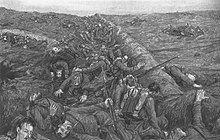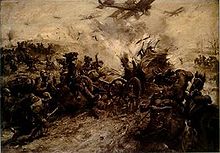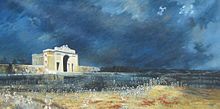Siegfried Sassoon
Appearance

And I was filled with such delight
As prisoned birds must find in freedom.

Drawing no dividend from time's to-morrows.
In the great hour of destiny they stand,
Each with his feuds, and jealousies, and sorrows.
Siegfried Sassoon (September 8, 1886 – September 1, 1967) was a British poet and writer, best remembered for the poems he wrote as a soldier in World War I. Decorated for bravery on the Western Front, he became one of the leading poets of the First World War.
Quotes
[edit]


- Let no one ever, from henceforth say one word in any way countenancing war. It is dangerous even to speak of how here and there the individual may gain some hardship of soul by it. For war is hell, and those who institute it are criminals. Were there even anything to say for it, it should not be said; for its spiritual disasters far outweigh any of its advantages.
- As quoted by Robert Nichols in his introduction to The Counter-Attack and Other Poems (1918)
- Everyone suddenly burst out singing;
And I was filled with such delight
As prisoned birds must find in freedom.- "Everyone Sang" (1919)
- The visionless officialized fatuity
That once kept Europe safe for Perpetuity.- On reading the War Diary of a Defunct Ambassador
- I must add that in the light of subsequent events it is difficult to believe that a Peace negotiated in 1917 would have been permanent. I share the general opinion that nothing on earth would have prevented a recurrence of Teutonic aggressiveness.
- Siegfried's Journey, 1916–1920 (1945), p. 57
A Soldier's Declaration (July 1917)
[edit]- I am making this statement as an act of wilful defiance of military authority, because I believe that the War is being deliberately prolonged by those who have the power to end it.
I am a soldier, convinced that I am acting on behalf of soldiers. I believe that this War, on which I entered as a war of defence and liberation, has now become a war of aggression and conquest.
- I have seen and endured the sufferings of the troops, and I can no longer be a party to prolong these sufferings for ends which I believe to be evil and unjust.
I am not protesting against the conduct of the war, but against the political errors and insincerities for which the fighting men are being sacrificed.
On behalf of those who are suffering now I make this protest against the deception which is being practised on them; also I believe that I may help to destroy the callous complacency with which the majority of those at home regard the contrivance of agonies which they do not share, and which they have not sufficient imagination to realize.
The Counter-Attack and Other Poems (1918)
[edit]
Who cheer when soldier lads march by,
Sneak home and pray you'll never know
The hell where youth and laughter go.

The unheroic Dead who fed the guns?

Rise and deride this sepulchre of crime.
- Mute in the clamour of shells he watched them burst
Spouting dark earth and wire with gusts from hell,
While posturing giants dissolved in drifts of smoke.
He crouched and flinched, dizzy with galloping fear,
Sick for escape,— loathing the strangled horror
And butchered, frantic gestures of the dead.
- Lost in a blurred confusion of yells and groans...
Down, and down, and down, he sank and drowned,
Bleeding to death. The counter-attack had failed.- "Counter-Attack"
- Soldiers are citizens of death's grey land,
Drawing no dividend from time's to-morrows.
In the great hour of destiny they stand,
Each with his feuds, and jealousies, and sorrows.
- "Dreamers"
- Soldiers are dreamers; when the guns begin
They think of firelit homes, clean beds, and wives.
- "Dreamers"
- If I were fierce, and bald, and short of breath,
I'd live with scarlet Majors at the Base,
And speed glum heroes up the line of death.
- I'd say — "I used to know his father well;
Yes, we've lost heavily in this last scrap."
And when the war is done and youth stone dead
I'd toddle safely home and die — in bed.- "Base Details"
- You smug-faced crowds with kindling eye
Who cheer when soldier lads march by,
Sneak home and pray you'll never know
The hell where youth and laughter go.
- October's bellowing anger breakes and cleaves
The bronzed battalions of the stricken wood
In whose lament I hear a voice that grieves
For battle's fruitless harvest, and the feud
Of outrage men. Their lives are like the leaves
Scattered in flocks of ruin, tossed and blown
Along the westering furnace flaring red.
O martyred youth and manhood overthrown,
The burden of your wrongs is on my head.- "Autumn"
Collected Poems (1949)
[edit]- Who will remember, passing through this Gate,
The unheroic Dead who fed the guns?
Who shall absolve the foulness of their fate, —
Those doomed, conscripted, unvictorious ones?
Crudely renewed, the Salient holds its own.
Paid are its dim defenders by this pomp;
Paid, with a pile of peace-complacent stone,
The armies who endured that sullen swamp.- "On Passing the New Menin Gate" (1927-1928)
- Here was the world's worst wound. And here with pride
'Their name liveth for evermore' the Gateway claims.
Was ever an immolation so belied
As these intolerably nameless names?
Well might the Dead who struggled in the slime
Rise and deride this sepulchre of crime.- "On Passing the New Menin Gate" (1927-1928)
Revisitation
[edit]- This poem is about W. H. R. Rivers.
- What voice revisits me this night? What face
To my heart’s room returns?
From the perpetual silence where the grace
Of human sainthood burns
Hastes he once more to harmonise and heal?
I know not. Only I feel
His influence undiminished
And his life’s work, in me and many, unfinished.
- O fathering friend and scientist of good,
Who in solitude, one bygone summer’s day,
And in the throes of bodily anguish, passed away
From dream and conflict and research-lit lands
Of ethnological learning, — even as you stood
Selfless and ardent, resolute and gay,
So in this hour, in strange survival stands
Your ghost, whom I am powerless to repay.
- Deep in my morning time he made his mark
And still he comes uncalled to be my guide
In devastated regions
When the brain has lost its bearings in the dark
And broken in it’s body’s pride
In the long campaign to which it had sworn allegiance.- Lines from a draft version of "Revisitation" omitted from final version.
Quotes about Siegfried Sassoon
[edit]- Just after we came up from dinner, two young men came—one very shy, the other to all appearances very much at his ease. The former was Siegfried Sassoon. He was in khaki: at first I only noticed his sticking-out ears and obvious embarrassment, but a closer scrutiny revealed great charm and a certain sweetness and grave strength in his countenance. I felt much drawn towards him, but had no conversation with him. Nichols, on the other hand, was twice introduced to me by the zealous hostess and we spent the remainder of the evening side by side. He was a thin alert face and is quick and agreeable to talk to—he expressed great admiration for Siegfried, both as poet and soldier. They have both had shell-shock. For Siegfried, he claimed astonishing valour. They each read some of their own poems... Siegfried in a terse, laconic style... Siegfried's have a brilliant, grim irony.
- Lady Cynthia Asquith, diary entry (15 November 1917), quoted in Lady Cynthia Asquith, Diaries, 1915–1918 (1968), p. 366
- Freyberg inveighed against the Georgian Poets and reproached me for holding a brief for Siegfried Sassoon. I maintained that, having fully demonstrated his personal physical courage, he had earned the right to exhibit moral courage as a pacifist without laying himself open to the charge of cloaking physical cowardice under the claim of moral courage.
Freyberg is very uncompromising in his condemnation and, with some justice, says it is offensive to come back and say, "I can't lead men to their death any more"—it implies a monopoly of virtue, as if other officers liked doing it because they acquiesced in their duty. He thought the poem called "The Hero" caddish, as it might destroy every mother's faith in the report of her son's death. Certainly Siegfried Sassoon breaks the conspiracy of silence, but sometimes I strongly feel that those at home should be made to realise the full horror, even to the incidental ugliness, as much as possible.- Lady Cynthia Asquith, diary entry (16 December 1917), quoted in Lady Cynthia Asquith, Diaries, 1915–1918 (1968), pp. 380-381
- As Sassoon's wartime diaries reveal, he was an extremely complex character, troubled by his homosexuality and anxious to prove his manliness in combat and so to earn the respect, perhaps even love, of his men. Also, as a poet first and foremost, he was never at ease with the majority of his fellow officers whom he found boorish, dull and snobbish, hence his delight in meeting other poets and literary men such as Graves, Owen and de Sola Pinto. Both on his own account, and for the reputation of poets, he wanted to prove himself a hero and did so in several gallant actions. But in seeking to protest against what he thought of as the excessive suffering of his men in an unduly prolonged war he allowed himself to be influenced by pacifists who had little respect for men in uniform and were disappointed that he did not provide publicity for their cause by going to prison.
- Brian Bond, Survivors of a Kind: Memoirs of the Western Front (2008), pp. 106-107
- Although his satirical poems hit some legitimate targets in shirkers, profiteers, hysterical women and home-front militarists, they are too sweeping, savage and self-centred to carry conviction. Indeed some now seem unnecessarily brutal, telling us more about the poet's troubled mind than about the war on the home or military fronts. Most seriously, at that time Sassoon shows no understanding of the meaning of the conflict in strategic or political terms. Although his protest had been well-intentioned and required great moral courage, it took another world war for him to admit that in 1917 there was no possibility for Britain or her allies to gain acceptable peace terms.
- Brian Bond, Survivors of a Kind: Memoirs of the Western Front (2008), p. 107
- It may be that it will be by his war poems that his name will last. He has gone far beyond them. His poems are diverse both in styles and subjects. As one critic has said: "There is no telling where a reader may fetch up when he goes out with this poet." But a poet is more than a man with metrical skill and an ability to make verbal music. (Sassoon is not high in this department.) He is a man apart from others. He has a way of looking at things that is not the ordinary man's. Sassoon has had his vigils and his visions. He has written
Allow me now much musing-space
To shape my secrecies alone.
Happily his Collected Poems allow us to share some of them.- Oliver Edwards, 'Siegfried's Journey', The Times (8 September 1966), p. 16
- If A Fox-Hunting Man presents the Edwardian Age as an idyll of hunting and cricket, The Old Century is a complementary idyll of a serenely cultivated existence carried on, like the former, in the atmosphere of perpetual summer.
- Michael Thorpe, Siegfried Sassoon: A Critical Study (1967), p. 131
- [A]s he relates the story there emerges a most delightful picture of English country life, by no means of its sporting side only. It is written in the pleasantest of good prose, simple, cool, and telling. It is marked by very vivid perception and by quiet and good-humoured irony.
- 'A Foxhunter's Memoirs.', The Times (5 October 1928), p. 8
- A review of Memoirs of a Fox-Hunting Man


